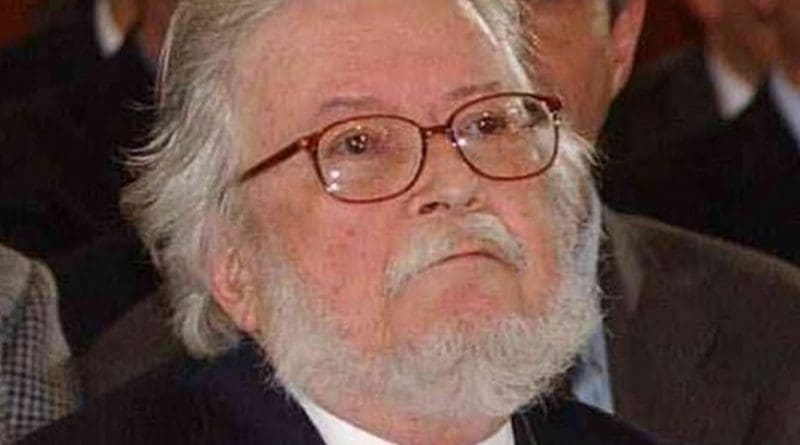Spain: Fernando Del Paso, Winner Of 2015 Cervantes Prize
Fernando del Paso has been awarded the 2015 Miguel de Cervantes Prize for Literature in Spanish. The jury’s decision was announced by Íñigo Méndez de Vigo, the Minister for Education, Culture and Sport during an event held at the headquarters of the Secretariat of State for Culture.
According to the minutes of the meeting, the jury awarded the prize “for his contribution to the development of the novel, combining tradition and modernity, as Cervantes did in his time. His novels take risks and recreate key episodes in the history of Mexico in a way that highlights their foundational character.”
The jury was composed of Inés Fernández-Ordóñez (chair), proposed by the Spanish Royal Academy; Juan Gelpi, representing the Puerto-Rican Academy of the Spanish Language; Pedro Manuel Cátedra, representing the Conference of Rectors of Spanish Universities (CRUE); Verónica Ormachea, representing the Union of Latin American Universities (UDUAL); Beatriz Hernanz, representing the Director of the Instituto Cervantes; Enrique Krauze, representing the Minister for Education, Culture and Sport; Oti Rodríguez Marchante, representing the Federation of Associations of Spanish Journalists (FAPE); Carmen Martina Intriago, representing the Latin American Federation of Journalists (FELAP); and Pierre Civil, representing the International Association of Hispanists.
José Pascual Marco, director general for Cultural and Book Policy and Industries, acted as secretary (with voice but no vote); and Mónica Fernández, deputy director general for Book Promotion, Reading and Spanish Literature, was records clerk (also with voice but no vote).
Biographical data
Fernando de Paso Morante (Mexico, 1935) has written non-fiction, children’s literature, fiction, poetry, theatre, etc. He studied biology and economics in the National University of Mexico, but abandoned his studies to dedicate himself to other activities. He received a grant from the Mexican Centre for Writers to complete his novel José Trigo, as well as from the Ford Foundation and the Simon Guggenheim Memorial Foundation.
He has lived outside Mexico for many years. From 1971 to 1985 he worked as producer of radio programmes, writer and announcer for the BBC in London and in Radio France Internationale in Paris. In 1986 he won the Spanish National Radio Prize for the best programme in Spanish for “Carta a Juan Rulfo” (Letter to Juan Rulfo). He was Cultural Attaché at the Embassy and Mexican Consul General in Paris. In 1992 he was appointed director of the Octavio Paz Ibero-American Library at the University of Guadalajara. Since 1996 he has been member of the Colegio Nacional (National Academy).
As a graphic artist and painter, his work has been exhibited in London, Paris, Madrid and a number of cities in the United States and Mexico.
His literary work has received numerous awards, including the Xavier Villarrutia Prize (1966) for José Trigo; the International Rómulo Gallegos Novel Prize (1982) for Palinuro de México; the Casa de las Américas prize in 1985 (Cuba); the Prix Médicis award for foreign novels (France) in 1986; the Mazatlán Literature award (1987) for Noticias del Imperio; the National Science and Arts, Linguistics and Literature award (Government of Mexico) in 1991; the FIL Latin American Literature and Caribbean Literature Award (2007); and the José Emilio Pacheco National Award for Excellence in Literature (International Yucatan Reading Fair) in 2015.
Works
Non-fiction: El coloquio de invierno (with Carlos Fuentes and Gabriel García Márquez), 1992; Yo soy hombre de letras: acceptance speech. Response by Miguel León-Portilla, 1996; Viaje alrededor del Quijote, 2004; Bajo la sombra de la historia: essays on Islam and Judaism, 2011.
Children’s literature: De la A a la Z por un poeta (with illustrations by Ignacio Junquera), 1988.
Fiction: José Trigo, 1966; Palinuro de México, 1980; Noticias del imperio, 1987; Linda 67. Historia de un crimen, 1995; Cuentos dispersos, 1999.
Poetry: Sonetos del amor y de lo diario, 1958; Paleta de diez colores (with illustrations by Vicente Rojo), 1992; PoeMar, 2004.
Theatre: Palinuro en la escalera, 1992; La loca de Miramar, 1998; La muerte se va a Granada: poema dramático en dos actos y un gran final, 1998.
Other genres: Visiones de un escritor, 1990; Douceur et passion de la cuisine mexicaine, 1991; Memoria y olvido, vida de Juan José Arreola (1920-1947) contada a Fernando del Paso, 1994; Trece Técnicas Mixtas, 1996; 2000 caras de cara al 2000, 2000; Castillos en el aire. Fragmentos y anticipaciones. Homenaje a Mauritz Cornelis Escher, 2002; El mito de dos volcanes: Popocatépetl, Iztaccíhuatl, 2005.
History of the Award
The award, with a monetary value of 125,000 euros, is an annual public testimony of admiration to the figure of a writer has helped to enrich the literary Hispanic legacy through his or her work.
The Cervantes Prize may be awarded to any author whose literary work is written totally or mostly in Spanish. Nominations for the award can be presented by the Academies of the Spanish Language; the winners from previous years; institutions that by their nature, purpose or content are linked to literature in Spanish; and members of the Jury.
The list of winners is a clear reflection of what the award means for culture in the Spanish language:
1976 Jorge Guillén
1977 Alejo Carpentier
1978 Dámaso Alonso
1979 Jorge Luis Borges y Gerardo Diego
1980 Juan Carlos Onetti
1981 Octavio Paz
1982 Luis Rosales
1983 Rafael Alberti
1984 Ernesto Sábato
1985 Gonzalo Torrente Ballester
1986 Antonio Buero Vallejo
1987 Carlos Fuentes
1988 Maria Zambrano
1989 Augusto Roa Bastos
1990 Adolfo Bioy Casares
1991 Francisco Ayala
1992 Dulce María Loynaz
1993 Miguel Delibes
1994 Mario Vargas Llosa
1995 Camilo José Cela
1996 José García Nieto
1997 Guillermo Cabrera Infante
1998 José Hierro
1999 Jorge Edwards
2000 Francisco Umbral
2001 Álvaro Mutis
2002 José Jiménez Lozano
2003 Gonzalo Rojas
2004 Rafael Sánchez Ferlosio
2005 Sergio Pitol
2006 Antonio Gamoneda
2007 Juan Gelman
2008 Juan Marsé
2009 José Emilio Pacheco
2010 Ana María Matute
2011 Nicanor Parra
2012 José Manuel Caballero Bonald
2013 Elena Poniatowska
2014 Juan Goytisolo Gay

